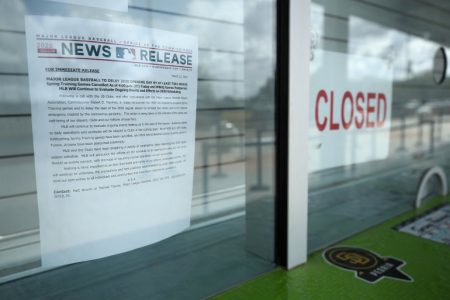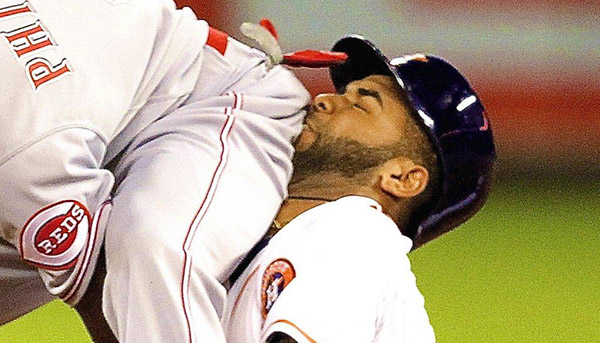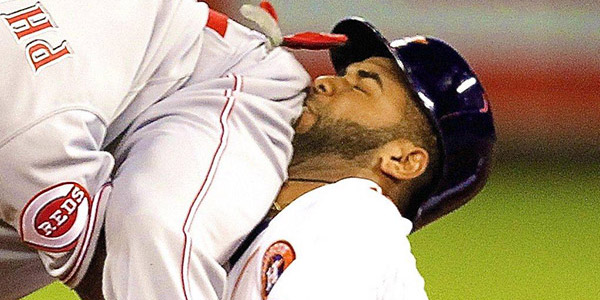A Coronavirus Short Season
 The coronavirus COVID–19 that has spread from China to all around the world is causing major disruptions to everyone’s lives, and all sports gatherings are on hold until things get under control. While we are all left foraging for toilet paper and hand sanitizer, it sure would be nice to have the distraction of sports to keep things feeling normal as with other national or global tragedies.
The coronavirus COVID–19 that has spread from China to all around the world is causing major disruptions to everyone’s lives, and all sports gatherings are on hold until things get under control. While we are all left foraging for toilet paper and hand sanitizer, it sure would be nice to have the distraction of sports to keep things feeling normal as with other national or global tragedies.
Major League Baseball hasn’t yet announced a shorter season plan for this year’s games, but that does seem like an inevitability. Even with adding double-headers or extending games into November, it just doesn’t seem realistic to get in 162 games for each team.
Of course, part of the beauty of baseball is its 162-game schedule. Teams have to prove over six months that they can win and win and win. That’s why they say it’s a marathon and not a sprint.
But desperate times call for desperate measures. And with all the worry and struggle in the world right now, a baseball season—even a shortened season—will help to make things feel less crazy. Fans may not be allowed to attend games at first, but you can bet the TV ratings will be through the roof as people tune in to watch.
So, what do we do? We turn that marathon into a sprint, and we give the people what they need. In 1981, teams played only 106 games due to the player strike and that worked, so let’s just say it’ll be that length. That’s essentially two-thirds of a season of exciting baseball game action.
Already on the plus side, the Orioles, Tigers, Giants and Mariners can rejoice because they won’t lose 100 games—though it can’t be completely ruled out with Baltimore. Let’s take a look at the ways that shaving off 56 games changes the dynamics of a normal season.
The Players’ Advantages
Every year, there are a couple dozen pitchers who enter the 162-game season with an innings limit due to recovering from an injury or being a developing prospect. With a 106-game season, teams will not have to worry about spreading out player workloads for the year. A player like Oakland’s Jesus Luzardo was going to have a 120-inning cap, but in a shortened season, even the workhorse pitchers like Max Scherzer and Jacob deGrom won’t get much more than 120 innings, so the Athletics don’t have to find a way to fill in for Luzardo’s shortfall.
Injured Players
This Spring Training saw what seemed like an unusually high number of minor injuries to top-end players. Aaron Judge, Giancarlo Stanton, Mike Clevinger, Carlos Carrasco and Justin Verlander all looked like they would be missing the start of the season. However, with the delayed start, all look like they’ll be available from the get-go.
Suspended Players
As of now, players serving suspensions will not have their penalties prorated. If you’re suspended for 50 games, you’re sitting out 50 games. Compared to the Yankees and their collection of injured players who have more time to recover, the Twins’ Michael Pineda still has his 60-game drug suspension to get through. That can’t possibly start until the season starts, so it would not be surprising in the least to see Minnesota’s World Series odds slide from the +1600 it was at when the start of the season was postponed.
Playoff Races
It’s baseball, and that means anything can happen. Without a full season, the best teams in baseball won’t necessarily be able to build huge leads, meaning more teams will be in the playoff hunt later into the season. It would be pretty cool going into the last week with 15 or 16 teams still playing meaningful games.
Strength of Schedule
If we say the league will start on June 1, it’s unclear whether MLB would generate all-new schedules or just have teams start up where they had previously scheduled. With a shorter season, the strength of each team’s opponents has even more significance. Teams that get to play against the Royals and Tigers have an advantage over teams that have to play the Red Sox and Rays.
Fast or Slow Starts
Do you remember last year when the Seattle Mariners got off to an amazing start of the season with one of the worst teams they’ve ever fielded? It was fun while it lasted. But we all knew it couldn’t last. After the first six weeks, they were neck and neck with Detroit for the worst team in the league. With a shortened season, a hot start like that might actually push a mediocre team into serious playoff consideration.
On the flip side, last year’s Red Sox team started off terribly in defense of its World Series Championship, and with a normal season, there were games for them to still have a chance. They wound up with a winning record but missed the playoffs. In a shortened season, that kind of start would mean they’re out, and it’s time to look forward to 2021.
There are lots of logistics to figure out for this unusual schedule. Things like the trade deadline, the All-Star Game, player service time tracking and stadium preparedness, and on an on. Of course, baseball teams, players and fans hope to return to all normalcy in 2021, but we’re all going to have to make some adjustments this year.
























